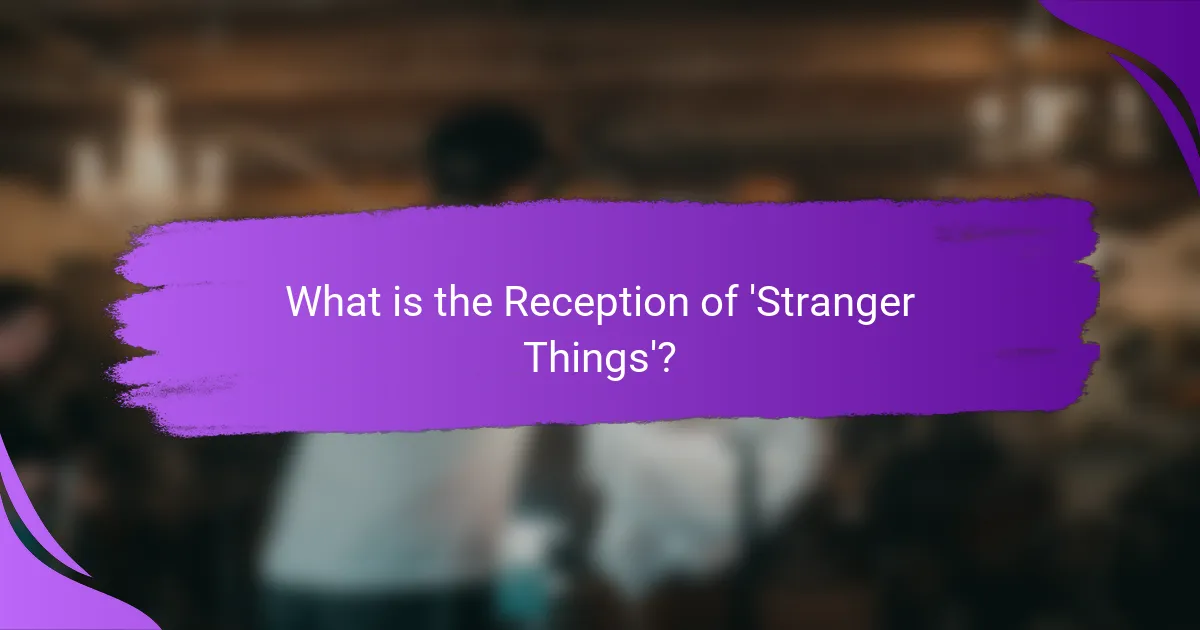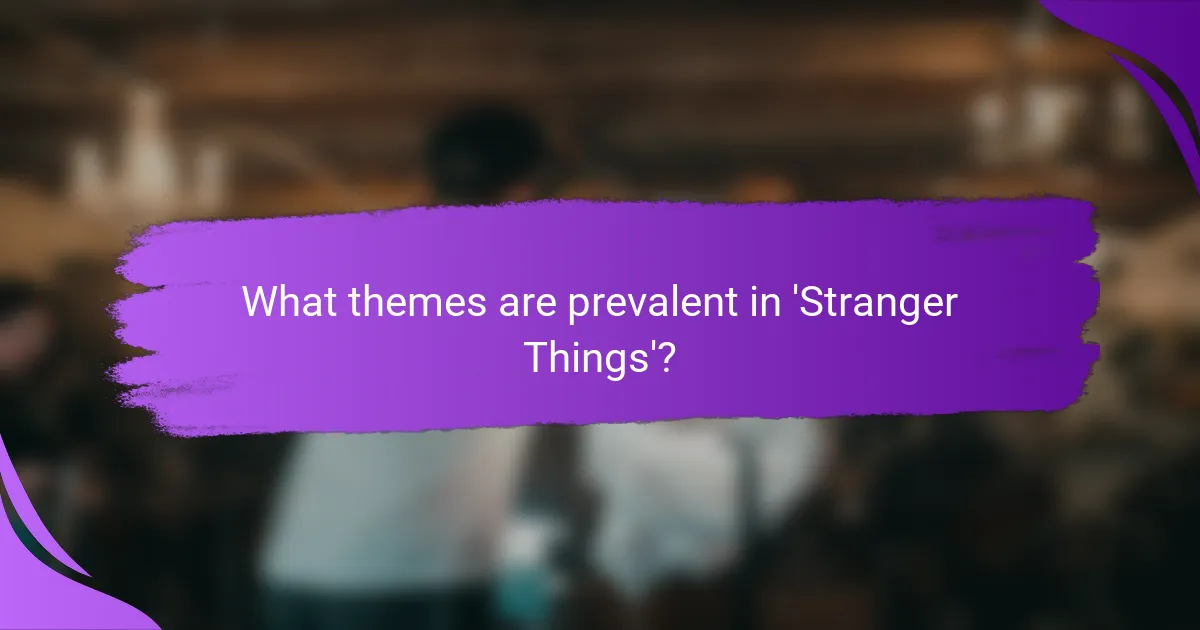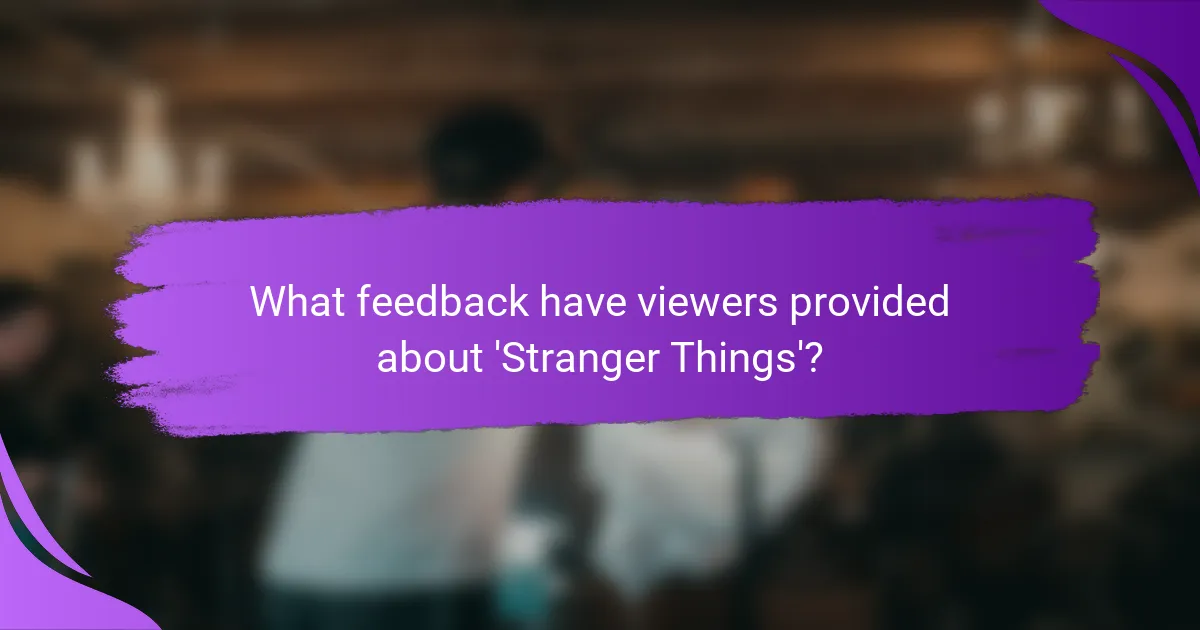‘Stranger Things’ is a critically acclaimed television series that has garnered a strong fan following since its debut. The show is celebrated for its nostalgic references to 1980s pop culture and its successful blend of horror, sci-fi, and coming-of-age themes. Key themes explored in the series include friendship, the battle between good and evil, and childhood trauma, all of which resonate with viewers. The series maintains high ratings on platforms like Rotten Tomatoes and IMDb, reflecting positive audience feedback and engagement. Additionally, ‘Stranger Things’ has made a significant impact on popular culture, evidenced by its merchandise and fan events, as well as numerous awards, including Screen Actors Guild Awards.

What is the Reception of ‘Stranger Things’?
‘Stranger Things’ received critical acclaim and a strong fan following since its debut. The series is praised for its nostalgic references to 1980s pop culture. Viewers appreciate its blend of horror, sci-fi, and coming-of-age themes. It holds a high rating on platforms like Rotten Tomatoes and IMDb. The first season has a 97% approval rating on Rotten Tomatoes. Audience engagement is reflected in its strong social media presence. The show also won several awards, including Screen Actors Guild Awards. Its impact on popular culture is evident through merchandise and fan events.
How has ‘Stranger Things’ been received by audiences and critics?
‘Stranger Things’ has been well-received by both audiences and critics. The series holds an impressive 91% approval rating on Rotten Tomatoes. Critics praise its nostalgic references to 1980s pop culture. Audiences appreciate its engaging storytelling and character development. The show has won several awards, including Screen Actors Guild Awards. Viewer ratings consistently reflect high satisfaction, with millions tuning in for each season. The blend of horror, science fiction, and coming-of-age themes resonates with a broad demographic. Overall, ‘Stranger Things’ has achieved significant acclaim and popularity since its debut.
What are the key factors influencing its reception?
Key factors influencing the reception of ‘Stranger Things’ include nostalgia, character development, and cultural references. Nostalgia plays a significant role as the show evokes memories of the 1980s pop culture. This connection resonates with viewers who grew up during that era. Character development is crucial; viewers become invested in the relatable and well-crafted characters. Additionally, cultural references enhance the viewing experience. They create a sense of familiarity and engagement. The show’s themes of friendship, bravery, and the supernatural also contribute to its appeal. Overall, these factors combine to shape positive viewer feedback and critical acclaim.
How do ratings and reviews reflect viewer opinions?
Ratings and reviews reflect viewer opinions by quantifying their experiences and sentiments towards a show. Ratings provide a numerical score that summarizes overall satisfaction. Reviews offer detailed narratives explaining individual viewer perspectives. High ratings typically indicate positive reception, while low ratings suggest dissatisfaction. For example, ‘Stranger Things’ received an average rating of 8.7/10 on IMDb, reflecting strong viewer approval. Reviews often highlight specific elements such as character development and nostalgia, influencing potential viewers’ decisions. Therefore, both ratings and reviews serve as indicators of audience reception and expectations.
What role does nostalgia play in the reception of ‘Stranger Things’?
Nostalgia significantly enhances the reception of ‘Stranger Things’. The series evokes memories of the 1980s through its visuals, music, and cultural references. This connection resonates with viewers who have a personal history from that era. Studies show nostalgia can create emotional bonds with content. Research indicates that nostalgic content often leads to increased viewer satisfaction and engagement. The show’s references to classic films and games further amplify this effect. This nostalgia attracts both older audiences and younger viewers interested in retro culture. Overall, nostalgia plays a crucial role in shaping positive viewer experiences with ‘Stranger Things’.
How does the show’s setting evoke nostalgia for the 1980s?
The show’s setting evokes nostalgia for the 1980s through its authentic depiction of the era’s culture and aesthetics. It features vintage clothing, classic toys, and retro technology that resonate with viewers’ memories. The soundtrack includes popular songs from the 1980s, enhancing the nostalgic experience. Iconic references to films and television of that decade are prevalent throughout the series. The small-town atmosphere mirrors the suburban life depicted in many 1980s films. Additionally, the show’s themes of friendship and adventure reflect the spirit of youth in that time. These elements collectively transport viewers back to their childhood experiences of the 1980s.
What specific cultural references contribute to this nostalgia?
Specific cultural references contributing to nostalgia in ‘Stranger Things’ include 1980s films, music, and video games. Iconic movies like ‘E.T. the Extra-Terrestrial’ and ‘The Goonies’ are heavily referenced. The show’s soundtrack features popular tracks from the era, such as those by Madonna and The Clash. Additionally, classic video games like Dungeons & Dragons play a significant role in the storyline. These references evoke memories for viewers who grew up in the 1980s. They create a sense of familiarity and connection to the past. Research indicates that nostalgia can enhance emotional engagement with media. This connection is evident in viewer feedback, highlighting the show’s impact on its audience.

What themes are prevalent in ‘Stranger Things’?
The prevalent themes in ‘Stranger Things’ include friendship, the battle between good and evil, and the impact of childhood trauma. Friendship is central to the narrative, showcasing the bond among the main characters as they face supernatural challenges. The series presents a clear battle between good and evil, often embodied by the characters’ fight against the Demogorgon and the Upside Down. Childhood trauma is explored through the characters’ backstories, particularly Eleven’s experiences, which shape their actions and relationships. These themes resonate with viewers, contributing to the show’s popularity and critical acclaim.
How do the themes of friendship and loyalty manifest in the series?
The themes of friendship and loyalty manifest prominently in “Stranger Things.” The characters demonstrate unwavering support for each other throughout various challenges. For example, the group frequently bands together to confront supernatural threats. Their loyalty is evident when they risk their safety for one another. The character Eleven showcases loyalty by protecting her friends at all costs. Additionally, the bond between Mike and Eleven highlights the strength of friendship amidst adversity. The series illustrates that true friendship can overcome even the darkest situations. Viewer feedback often praises these themes as central to the show’s emotional impact.
What examples illustrate these themes in character interactions?
Character interactions in ‘Stranger Things’ illustrate themes of friendship and loyalty. For example, the bond between Eleven and Mike showcases deep emotional connections. Their relationship highlights themes of trust and support during challenging times. Another example is the group dynamics among the kids, which emphasize teamwork against common threats. The interactions also reflect nostalgia for childhood friendships. The characters’ reliance on each other during supernatural events reinforces the theme of unity. Additionally, the character of Hopper exemplifies protective instincts, particularly towards Eleven. These interactions resonate with viewers, evoking memories of their own friendships.
How do these themes resonate with viewers of different ages?
Themes in ‘Stranger Things’ resonate differently with viewers of various ages. Younger viewers connect with the adventure and supernatural elements. They often relate to the characters’ friendships and coming-of-age experiences. Older viewers, particularly those who grew up in the 1980s, experience nostalgia. They recognize cultural references and themes from their youth. Research shows that nostalgia enhances emotional engagement. A study published in the Journal of Consumer Research indicates that nostalgic content can evoke positive feelings across age groups. This emotional response can lead to a deeper connection with the show’s themes. Thus, ‘Stranger Things’ effectively engages a broad audience by appealing to both young and older viewers through its themes.
What is the significance of the supernatural elements in ‘Stranger Things’?
The supernatural elements in ‘Stranger Things’ are significant as they drive the narrative and explore themes of fear and friendship. These elements create tension and suspense, enhancing the horror aspect of the show. They also serve as a metaphor for the challenges of adolescence, reflecting the characters’ struggles. The Upside Down, a parallel dimension, symbolizes the unknown and the fears of growing up. Additionally, supernatural occurrences allow for character development and deepen relationships among the group of friends. The series uses these elements to evoke nostalgia for 1980s pop culture, drawing on familiar horror tropes. This blend of the supernatural with relatable experiences resonates with viewers, contributing to the show’s popularity.
How do these elements enhance the overall narrative?
Nostalgia, themes, and viewer feedback enhance the overall narrative of ‘Stranger Things’ by creating emotional connections. Nostalgia evokes fond memories of the 1980s, making the story relatable. This connection engages viewers on a personal level. Themes of friendship, courage, and the battle between good and evil resonate universally. They provide depth to character development and plot progression. Viewer feedback shapes the narrative by influencing creators’ decisions in subsequent seasons. This interaction fosters a sense of community among fans. Collectively, these elements enrich the storytelling experience and maintain viewer interest.
What impact do they have on viewer engagement and reception?
Nostalgic elements in ‘Stranger Things’ significantly enhance viewer engagement and reception. This series evokes memories of the 1980s, appealing to both older viewers and younger audiences through retro aesthetics. The incorporation of familiar cultural references fosters a sense of connection among viewers. According to a study by the University of Southern California, nostalgia can increase emotional investment in characters and storylines. Viewers often express heightened enthusiasm and loyalty towards shows that resonate with their personal experiences. This emotional engagement translates to positive reception and increased viewership metrics, as evidenced by ‘Stranger Things’ consistently high ratings on platforms like Netflix.

What feedback have viewers provided about ‘Stranger Things’?
Viewers have provided overwhelmingly positive feedback about ‘Stranger Things’. Many praise its nostalgic elements, particularly the 1980s references. The show’s character development is frequently highlighted as a strong point. Viewers appreciate the mix of horror, adventure, and friendship themes. The writing and direction receive commendations for their quality and creativity. Some critics note pacing issues in later seasons. Overall, the series maintains a strong fan base and cultural impact. Ratings consistently reflect high viewer satisfaction, with an average score of 8.7 on IMDb.
What are the common praises expressed by fans?
Fans commonly praise ‘Stranger Things’ for its nostalgic references to the 1980s. They appreciate the show’s ability to evoke fond memories of that era. Viewers often highlight the strong character development throughout the series. Many fans express admiration for the show’s engaging plot and suspenseful storytelling. The visual aesthetics and production quality receive positive feedback as well. Additionally, fans commend the performances of the cast, particularly the child actors. The incorporation of supernatural elements adds to its appeal. Overall, the blend of horror, adventure, and friendship resonates strongly with the audience.
How do viewers describe their emotional connections to the characters?
Viewers describe their emotional connections to the characters in ‘Stranger Things’ as deep and personal. Many express feelings of nostalgia, relating to the characters’ experiences. They often connect through shared struggles and triumphs depicted in the series. Viewers mention that the characters evoke empathy and understanding. The show’s portrayal of friendship and loyalty resonates strongly. Specific character arcs, such as Eleven’s journey, elicit strong emotional responses. Fans frequently share their attachment to the characters on social media platforms. This connection enhances their overall viewing experience and engagement with the series.
What aspects of the storytelling do fans appreciate most?
Fans appreciate the character development in ‘Stranger Things’ storytelling. Each character undergoes significant growth throughout the series. Viewers connect with their struggles and triumphs. The nostalgic references to the 1980s resonate deeply with the audience. This nostalgia enhances emotional engagement with the plot. Additionally, the blend of supernatural elements with relatable themes captivates fans. The show’s ability to balance horror and humor creates a unique viewing experience. These aspects contribute to the show’s widespread acclaim and dedicated fanbase.
What criticisms have been raised regarding ‘Stranger Things’?
Criticisms raised regarding ‘Stranger Things’ include its reliance on nostalgia. Critics argue that the show leans heavily on 1980s pop culture references. This approach can overshadow original storytelling. Additionally, some viewers feel the character development is inconsistent. Certain characters lack depth or undergo abrupt changes. Pacing issues have also been noted, particularly in later seasons. Critics claim that some episodes drag on without significant plot advancement. Furthermore, the show’s complex mythology can confuse audiences. Some find it difficult to follow the narrative threads. Overall, these criticisms highlight concerns about originality and coherence.
What common complaints do viewers mention?
Viewers commonly mention pacing issues as a complaint. Many feel that certain episodes drag on without sufficient plot development. Some viewers also express dissatisfaction with character arcs. They believe some characters lack depth or undergo inconsistent development. Additionally, there are complaints about the show’s reliance on nostalgia. Some viewers feel it overshadows original storytelling. Lastly, a segment of the audience criticizes the handling of certain themes. They argue that some themes are not explored deeply enough for impact.
How do these criticisms affect the overall perception of the series?
Criticisms significantly impact the overall perception of the series. Negative feedback can diminish audience enthusiasm and trust. For instance, some viewers express disappointment in plot inconsistencies. This can lead to reduced viewership and engagement in subsequent seasons. Additionally, critical reviews often shape public discourse around the series. High-profile critiques can influence potential new viewers’ decisions to watch. Conversely, some criticisms may spark discussions that enhance interest. Overall, the way criticisms are addressed can determine the series’ long-term legacy.
How can understanding viewer feedback improve future seasons?
Understanding viewer feedback can significantly enhance future seasons of a show. Viewer feedback provides insights into audience preferences and expectations. Analyzing this feedback identifies popular characters and storylines. It also highlights elements that may have disappointed viewers. For instance, a survey conducted after Season 3 of “Stranger Things” revealed that fans wanted more character development. This information can guide writers in crafting more engaging narratives. Additionally, viewer feedback can inform marketing strategies for upcoming seasons. Engaging with the audience fosters a sense of community and investment in the show’s future. Overall, leveraging viewer feedback leads to a more successful and resonant series.
What strategies can creators implement based on audience insights?
Creators can implement targeted content strategies based on audience insights. Analyzing viewer demographics helps tailor themes and narratives that resonate with specific groups. Engagement metrics reveal which elements of the show captivate audiences the most. Incorporating feedback into character development can enhance relatability and emotional connection. Utilizing social media trends can inform promotional strategies and content timing. Conducting surveys allows creators to gather direct viewer preferences and suggestions. Collaborating with influencers can expand reach and attract new viewers based on existing audience interests. Audience insights guide creators to refine their storytelling and marketing efforts effectively.
How can viewer engagement shape the direction of the series?
Viewer engagement can significantly shape the direction of a series by influencing plot development and character arcs. Feedback from viewers often guides writers in understanding audience preferences. For example, in “Stranger Things,” fan theories and discussions have led to changes in storylines. The show’s creators monitor social media and fan forums for insights. This engagement can result in renewed focus on popular characters or themes. Additionally, audience reactions can drive the introduction of new elements. Ratings and viewership statistics also provide tangible data for decision-making. Overall, viewer engagement serves as a vital feedback loop, helping creators align the series with audience expectations.
The main entity of the article is ‘Stranger Things,’ a television series noted for its critical acclaim and strong fan following. The article examines the show’s reception, highlighting its nostalgic references to 1980s pop culture, themes of friendship and childhood trauma, and the impact of supernatural elements. It also analyzes viewer feedback, including praises for character development and storytelling, as well as criticisms related to pacing and reliance on nostalgia. Overall, the article provides a comprehensive overview of how these factors contribute to the series’ popularity and cultural significance.